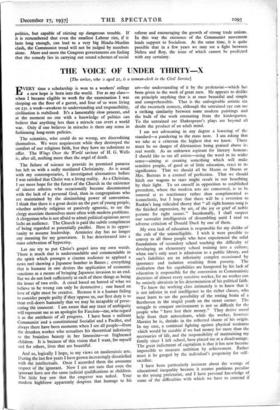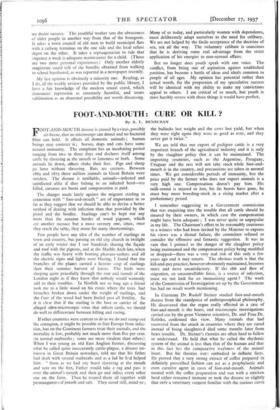THE VOICE OF UNDER THIRTY -X
[The writer, who is aged 21, is a woman-clerk in the Civil Service] EVERY time a scholarship is won to a workers' college a new hope is born into the world. For as my class— when I became eligible ro work for the examination I was sleeping on the floor of a garret, and four of us were living on 25s. a week—awakens to understanding and responsibility, civilisation is stabilised,. It's a lamentably slow process, and at the moment no one with a knowledge of politics can believe that anything less than a miracle can avert a world war. Only if one believes in miracles is there any sense in fashioning long-term policies.
The scientists, who could do no wrong, are discrediting themselves. We were acquiescent while they destroyed the comfort of our religious faith, but they have no substitute to offer. The Wings Over the World saviour of H. G. Wells is, after all, nothing more than the angel of death.
The failure of science to provide its promised panacea has left us with a sadly mutilated Christianity. As is usual with my contemporaries, I investigated alternatives before I was satisfied that Christ was a living reality. As a Christian, I see more hope for the future of the Church in the existence of sincere atheists who occasionally become discontented with the lack of a personal God, than in congregations who are maintained by the diminishing power of convention. I think that there is a great desire on the part of young people, whether actively religious or passively agnostic, to see the clergy associate themselves more often with modern problems. A clergyman who is not afraid to admit political opinions never lacks an audience. The Church is paid the subtle compliment of being regarded as potentially pacifist. Here is its oppor- tunity to assume leadership. Armistice day has no longer any meaning for my generation. It has deteriorated into a mass celebration of hypocrisy. .
Let me try to put Christ's gospel into my own words. There is much that 'is understandable and commendable in the spirit which prompts a cinema audience to applaud a news reel showing a Japanese bomber in flames ; everything that is humane in one desires the application of economic sanctions as a means of bringing Japanese invasion to an end. But we do not look sufficiently at each of these things as being the lesser of two evils. A creed based on hatred of what we believe to be wrong can only be destructive ; one based on love of right must be creative. Because it is a human failing to consider -people guilty, if they 'oppose us, our -first duty is to treat evil-doers humanely that we may-be incapable of perse- cuting the innocent. I am aWare that any trace of ambiguity will represent me as an apologist for Fascism—me, who regard it as the antithesis of all progress. I have been a militant Communist and a constitutional Socialist and a Pacifist, and always there have been moments when I see all people—from the drunken .worker who actualises his theoretical inferiority to the brainless beauty in her limousine=-as frightened children: It is because of this vision that I want, for myself and for others, lives that are beautiful.
And so, logically I hope, to my views on modernistic arts. During the last few years I have grown increasingly dissatisfied with the intellectuals. Once I accorded them the awesome respect of the ignorant. Now I am not sure that even the, ignorant have not the same judicial qualifications as children. The little boy saw that the emperor was naked. Your modern highbrow apparently despises that homage to his art—the understanding of it by the proletariat—which has been given to the work of great men. He appears to dislike on principle anything that is at once beautiful and simple and comprehensible. That is the unforgivable artistic sin of the twentieth century, although the untrained eye can see a striking similarity between some modern paintings and the bulk of the work emanating from the kindergarten. To the untrained ear Shakespeare's plays are beyond all doubt the product of an adult mind.
I am not advocating in any degree a lowering of dr.: standard—a pandering to the mass taste. I am asking that we take as a criterion the highest that we know. There must be no danger of dilettantism being praised above its real worth. As an unknown aspirant for literary honours I should like to see all artists—using the word in its wider sense—aiming at creating something which will make sensitive people, of good or of little education, react to its significance. That we should all be Munis or Ibsens or Mrs. Beetons is a counsel of perfection. That we should hitch our wagons to stars might result in our benefiting by their light. To set oneself in opposition to established precedent, where the modern arts are concerned, is to be sneered at as reactionary rather than complimented as iconoclastic, but I hope that there will be a reversion to Ruskin's long ridiculed theory that " all right human song is the finished expression, by art, of the joy or grief of noble persons for right causes." Incidentally, I shall suspect our surrealist intelligentsia of dissembling until I read an adverse criticism of Donald Duck by one of them.
My own lack of education is responsible for my dislike of the cult of the unintelligible. I wish it were possible to convey to all those people who have experienced the solid foundations of secondary school teaching the difficulty of developing an elementary school training into a culture, when one's only asset is admission to a public library, and one's liabilities are an inferiority complex occasioned by ignorance and isolation resulting from poverty. The realisation that his capabilities are hampered by his lack of education is responsible for the conversion to Communistic doctrines of almost every sensitive worker, for no worker can be entirely altruistic in his determination of his political faith. To know the working class intimately is to know that it is not inferior in real intelligence to the richer classes, who must learn to see the possibility of the rotting brain of a Beethoven in the stupid youth on the street corner. The struggle to conquer environment is not so difficult for the people who " have lost their money." They derive moral help from their antecedents, while the worker, however Marxist he is, shrinks in the reflected shame of his origin.. In my case, a continual fighting against physical weakness which would be curable if we had money for more than the necessaries of life, and the responsibility of maintaining my fatuity since I left school, have placed me at a disadvantage. The great indictment of capitalism is that it has now become impossible to measure ambition by achievement. Rather must it be gauged by the individual's propensity for self- sacrifice.
I have been particularly insistent about the wrongs of educational inequality because it creates problems peculiar to the young proletariat, and I have personal knowledge of some of the difficulties with which we have to contend if we desire success. The youthful worker sees the obtuseness of older people in another way from that of the bourgeois. It takes a town council of old men to build municipal flats with a railway terminus on the one side and the local refuse depot on the other. It takes a septuagenarian to rule that sixpence a week is adequate maintenance for a child. (Those are two more personal experiences.) Only another elderly magistrate could talk of the benefits obtained from walking to school barefooted, as was reported in a newspaper recently.
My last opinion is obviously a minority one. Reading, as I do, all the weekly reviews provided by the public library, I have a fair knowledge of the modern sexual creed, which denounces repression as extremely harmful, and treats sublimation as an abnormal possibility not worth discussing. Many of us today, and particularly women with dependants, must deliberately adapt ourselves to the need for celibacy. We are not helped by the facile acceptance of the doctrine of sex, sex all the way. The voluntary celibate is conscious that he is deriving some real advantage from the strict application of his energies to non-sensual affairs.
But no longer does youth speak with one voice. The conflict, from being one of aspiration against established position, has become a battle of ideas and ideals common to people of all ages. My opinion has potential rather than actual worth, for the proportion of my speculative success will be identical with my ability to make my convictions appeal to others. I am critical of so much, but youth is most harshly severe with those things it would have perfect.















































 Previous page
Previous page